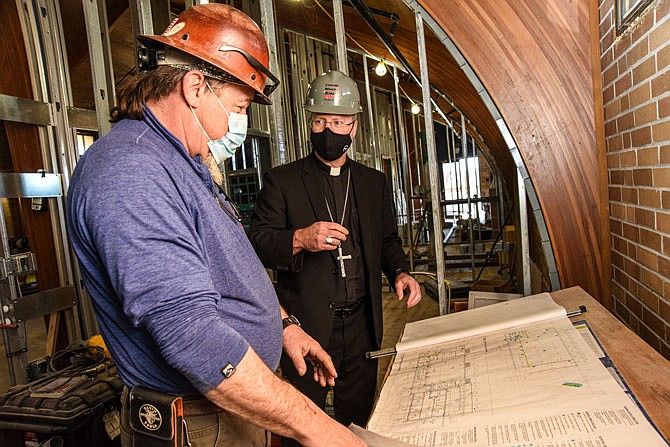Bishop W. Shawn McKnight, of the Catholic Diocese of Jefferson City, described development of a pastoral plan for the diocese as having grown from the bottom up.
It focuses on the stewardship of parishes - the wise use of the gifts each person brings to a parish.
Oftentimes, parishes spend their time reflecting on what the bishop's vision is, then they try to figure out what they need to do in their own parish, McKnight said.
What's different for the new diocesan pastoral plan, he said, is the diocese went to parishes and shared what the pope has asked Catholics to consider about what it means to be a church. Then, the diocese told parishioners it wanted them to make their own plan first.
"The diocesan plan is our strategy for leveraging our diocesan resources to assist the parishes accomplish their goals - their dreams," he said.
The diocese asked parishes to submit plans. Then it looked at them for patterns.
"There were a lot of similar common themes - concern, very strong, for the next generation, the youth, and how we pass on the faith," McKnight said. "And fallen-away Catholics - how do we invite them back? First of all, how do we become a more welcoming place where people want to come to?"
They were very strong concerns, he continued.
In 2018, following the sex abuse scandal surrounding former Cardinal Theodore McCarrick and publication of the Pennsylvania grand jury report on clergy abuse, McKnight began holding listening sessions across the Jefferson City diocese.
What he heard reflected Pope Francis' "Evangelii gaudium" - "Joy of the Gospel," his apostolic exhortation from 2013 discussing Christians' obligations to help the poor and call for society to change its priorities. He calls on the entire church to focus on transforming its missionary work through each parish.
"Pope Francis is a strong advocate, of course, for the church doing a better job of reaching out to the people rather than expecting, waiting for people to come into the church," McKnight said. "And that people recognize the church that is the community of disciples that we are, as a place to go for mercy and help."
While reviewing the parish plans, it became clear to the diocese to achieve that goal of every parish (and the Catholic Church) being recognized - not just by Catholic parishioners, but by the wider community - as a place to go for help, it has to change the people's mindset about what the church is and what it is all about, McKnight said.
People in the parishes were grateful to the bishop for allowing them to share their voices in the pastoral plan, said LeAnn Korsmeyer, the diocese's director of women's ministries.
"They were very appreciative that the bishop has allowed them to use their voice and to speak on their dreams of their church and how they can create this sense of center," Korsmeyer said.
McKnight, on the third anniversary of his ordination as bishop, was invited to celebrate Mass at the Catholic Newman Center at the University of Missouri in Columbia. He used that as the time when he would sign the pastoral letter initiative.
"They hear a lot that 'You're important, the youth, because you're the church of the next generation,'" McKnight said. "That's kind of true. But the fact is you're part of the church now. You already have a role to play. Because you're young, I need you with your fresh eyes and your energy to help me change this church. That's what we're called to do. We need to change."
That's why the letter starts out strongly, McKnight said.
The sex abuse tragedy, decline in youth participation in church programs, falling number of youth seeking ministerial vocations, changes in rural demographics and the pandemic are discouraging and push people to despair, the letter begins. And something has to change for local churches to thrive and fulfill their missions.
"I so desire that the Lord may enliven our diocese!" the letter says. "I desire that the Lord may help all our parishes to be beacons of hope for their parishioners and the wider community, to be communities of faith where we encounter the Lord together in these challenging times."
Korsmeyer was involved in setting up disaster teams in every parish when the COVID-19 pandemic began. And youth got involved, she said.
People came together and formed teams in all of the diocese's parishes. Members of the disaster response teams talked among themselves, asking what gifts they could use, she said - what do they know, or what is their experience?
"If a tragedy or a disaster happened, what will we need to assist others with their most immediate needs?" Korsmeyer said. "Can we get food to people? Do people need rides to the doctor? Do they need medicine picked up? Food brought to them?"
Parishes thought ahead, McKnight said, and acted immediately.
And they have started to act as those community resources - places for people to get help or give help, regardless of whether they are Catholic.
"It's been interesting to see how - even today - people are calling their parishes," Korsmeyer said. "They've heard about these disaster responder teams. It could be someone that's called to say 'Can you check on my mom? I'm out of state.' We've been able to marry those up with volunteers."
The diocesan plan leverages resources to help parishes in achievement of their own parish plans, according to the letter. It includes a three-year plan with activities to help implement the three priorities:
Strengthening participation (and focus on the spirituality of stewardship).
Strengthening co-responsibility (encouraging laity to assume their role in the family of parishes).
Strengthening charity and mercy (helping parishes identify unmet needs in their areas and creating an assessment tool to help determine how parishes foster personal experience of mercy).


